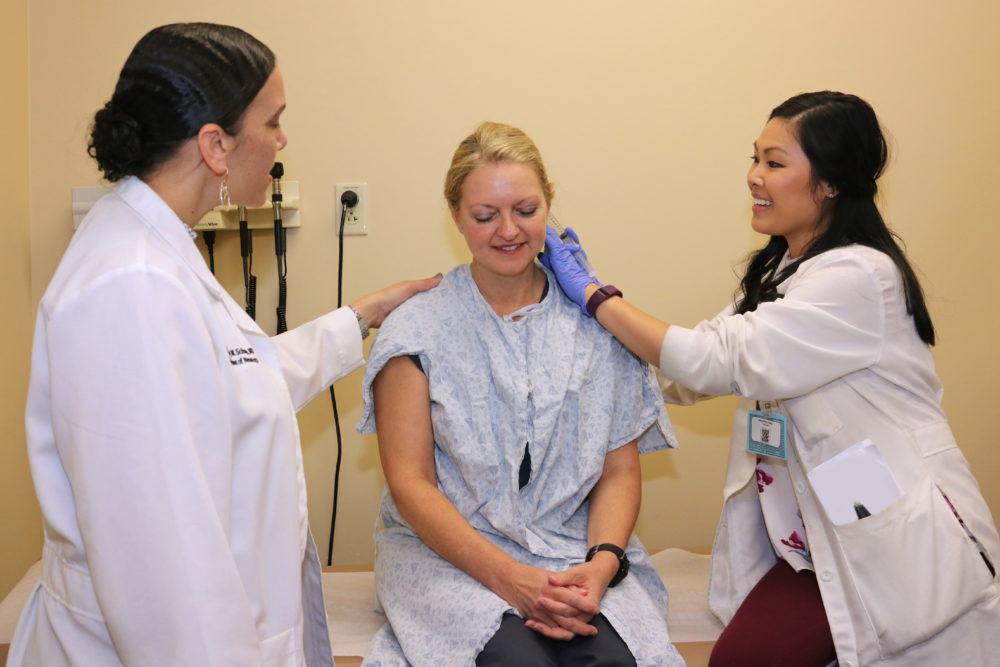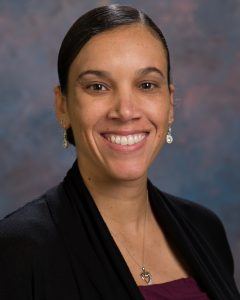
Former Barrow Resident Becomes Director of Neurology Residency Program
“My older brother was born with cerebral palsy and severe intellectual impairment,” she said. “I think growing up and seeing some of the struggles that he had and how my family navigated those sparked my interest in the brain.”
The more exposure she had to neurology, the more she realized she had found the right field. After receiving her bachelor’s degree in physiological sciences from the University of California, Los Angeles, she worked with a neurologist on headache research. In medical school at Michigan State University, she gravitated toward the neurological cases.
When it came time to apply for residencies, she ranked the Neurology Residency Program at Barrow Neurological Institute as her top choice.
The California native has called Barrow home ever since. After graduating from the residency program, she completed an epilepsy fellowship and joined the faculty as a neurologist. She now has a new role: director of the Neurology Residency Program.
From Resident to Director
The director of the program is responsible for many of the administrative duties, including working with the Accreditation Council for Graduate Medical Education.

Director, Neurology Residency Program
“But I also see my role as being a bridge between those things and the residents and creating an environment where residents feel like they have input into their program,” Dr. Schusse said.
It’s a natural step for Dr. Schusse, who not only completed her own training at Barrow but who also became the program’s first associate director in 2015—a position now held by neurologist Dr. Glynnis Zieman. Dr. Zieman also completed her residency and fellowship training at Barrow.
“As we’ve grown and added more residents to our program, it sort of necessitated splitting the workload with an associate program director,” Dr. Schusse said. “I had approached both Dr. Suraj Muley and Dr. Jeremy Shefner about it when I became faculty because of my interest in resident education and dedication to the program itself.”
Dr. Muley served as director of the Neurology Residency Program for five years. He recently stepped down to focus on other projects.
“Dr. Schusse will bring new energy to the program and a different outlook,” he said. “I think her passion for education coupled with her ability to motivate residents will further enhance what we have accomplished in the last five years.”
The Barrow Difference
When Dr. Schusse interviewed for the Neurology Residency Program at Barrow, she took notice of the collegial environment. It’s something she hopes to maintain as director.
“The residents get along well with each other,” she said. “I think that’s been a consistent goal with recruitment both on the faculty side and the resident side to foster an environment of camaraderie and sense of teamwork.”
She also acknowledged coordinator Ann Chowdhury Johnson as a major asset to the program, particularly for helping medical school graduates transition into their residency and, in many cases, a new city.
Dr. Schusse will bring new energy to the program and a different outlook. I think her passion for education coupled with her ability to motivate residents will further enhance what we have accomplished in the last five years.
-Dr. Suraj Muley, Barrow Neurologist
“She’s the first voice that you hear,” Dr. Schusse said. “She sends welcome emails out when we match residents, and it really makes you feel at home here.”
Another unique aspect of the residency program that Dr. Schusse noted is the well-rounded education it provides. Barrow residents work with many different specialists under one roof and are exposed to a variety of neurological conditions—both common and uncommon.
“We see a diverse patient base,” she said. “We have people come from all over to see us here. You can really see the depth and breadth of neurology here. I think it’s unmatched anywhere.”
Dr. Schusse likes that the curriculum and didactics of the program have remained fluid over the years, with changes implemented based on resident and faculty feedback, but she still sees room for growth in the academic sphere.
“One of the things I’m encouraging a little bit more in my role now is to have our residents publish more and present at more conferences,” she said, adding that Barrow covers travel expenses for residents when they give presentations. “I would really like to see an increase in academic output, networking, and getting the Barrow name out there with even greater visibility.”
